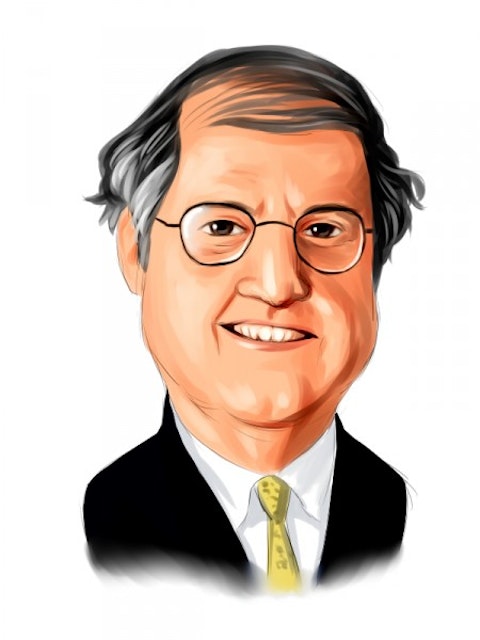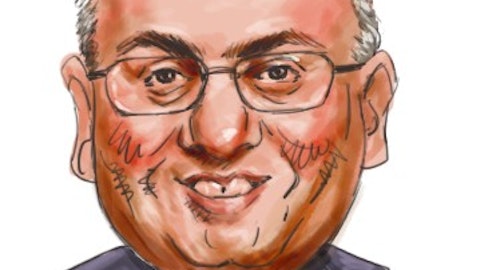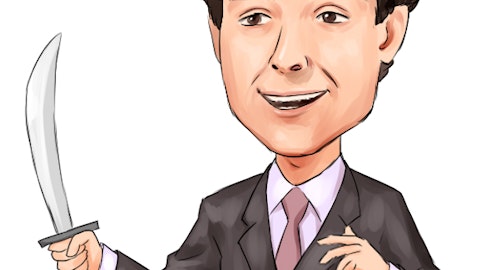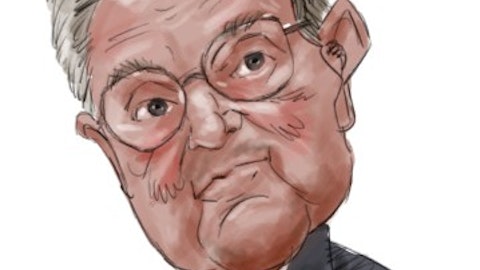Best Buy Co., Inc. (NYSE:BBY) is the leading retailer of consumer electronics. In August, Richard Schulze, Best Buy founder and former chairman, announced plans to take the company private for $24-$26 per share. Schulze stepped down as chairman in June after allegations from the board concerning the former CEO’s relations with an employee. Schulze still owns around 20% of the company.
Best Buy’s stock price traded over $20 on the news that Schulze was putting together a takeover bid, but has since fallen back below this mark and as low as $17 since the news. While many investors would like to believe that Schulze can pull off the takeover there are concerns over his ability to put together the funding, which would require upwards of $10 billion on the high end.
We believe there are a few top-name hedge funds that are rooting for Schulze to pull off this takeover. At the end of 2011, when the likes of Bill Miller of Legg Mason, Steven Cohen of SAC Capital and D.E. Shaw were unloading their shares of Best Buy, David Einhorn of Greenlight Capital and Ray Dalio of Bridgewater Associates increased their positions by 10% and 46%, respectively.
Then, just as Einhorn unloaded 84% of his 7.7 million shares in the second quarter, Dalio, Miller and Cohen boosted their ownership. At the time it appeared that perhaps some of these hedge funds saw Best Buy to be a good buy. It is worth noting that Einhorn did not fully close his Best Buy position in the second quarter and still owns 1.2 million shares (see all the hedge funds holding Best Buy here).
At the time when these funds were getting into Best Buy they were unaware that Schulze was considering a takeover bid, but there were various talks in the news about Best Buy being a potential takeout target by private equity firms. Whether we believe that Dalio, Cohen and the others are in Best Buy purely based on the potential for a takeover would be speculation on our part, but many of the funds owning Best Buy also have a position in Amazon (see all the hedge funds owning Amazon here), which is slowly killing the Best Buy business model.
Amazon.com, Inc. (NASDAQ:AMZN) has been Best Buy’s greatest competition of late. By offering lower prices, Amazon has become a key competitor, taking market share from the big box retailer. Best Buy has become more of a show room, a way to try out and view products before buying them from online retailers. Amazon operates as an ecommerce company that has had much success infringing on all brick-and-mortar retailers. Amazon trades at a 320 P/E and has a market cap almost twenty times that of Best Buy, but Best Buy still managed to top Amazon on revenue, coming in at $50 billion versus Amazon’s $48 billion for the most recent fiscal year. However, it’s Best Buy’s cost structure, namely their fixed costs, that place a strain on the company. Best Buy managed to lose $1.2 billion during the most recent fiscal year, while Amazon made $631 million on a net income basis.
Best Buy faces intense competition, competing not only versus online ecommerce companies, but against other consumer electronics chains and department stores such as Staples, Inc. (NASDAQ:SPLS), Wal-Mart Stores, Inc. (NYSE:WMT), Target Corporation (NYSE:TGT) and RadioShack Corporation (NYSE:RSH). When comparing Best Buy to these competitors, both Best Buy and RadioShack have trailing negative EPS and trade at a P/S of 0.1. While the other competitors trade at P/E ratios of: Staples 10x, Wal-Mart 15x and Target 15x. Additionally, Target has announced plans to partner with RadioShack to offer mobile phone kiosks, which is a direct attack on Best Buy’s turnaround strategy of closing larger retail stores and opening stores that are less than a tenth of the size that focus solely on mobile devices and services. Best Buy shares are currently trading at a forward P/E of 6.3, while the five-year average P/E for the company is around 11.
Although the past and future challenges may well already be reflected in its stock price, the worry is that Best Buy might be a value trap. With margin compression, online competition, a CEO shakeup and uncertainty surrounding a turnaround it is likely that Best Buy does deserve to trade at multiples below industry averages. For the second quarter, Best Buy reported EPS of $0.20, while estimates were $0.31. Sales for the second quarter were $10.6 billion, down 2.8% from the prior quarter and comp sales were down 3.2%. There is still limited ability to assess the viability of the company’s turnaround strategy with mixed estimates on earnings, but expectations for 2014 EPS show a 6.3% decline from 2013 estimates, with 2013 EPS estimates being $3.17 and 2014 EPS being $2.97.
Although the company does pay a relatively healthy dividend, yielding 3.7%, the risk is that dividend payments will not compensate for a longer than expected turnaround period, and any further decline of the stock’s price. We do not see a likelihood that Best Buy will have to suspend its dividend in the near future, as it had close to $680 million in cash at the end of the second quarter and its total annual dividend payments amount to $230 million. Best Buy also still manages to generate strong free cash flow, generating $2.3 billion for its latest fiscal year, an increase from $510 million in the prior year.
Schulze’s takeover bid might be the company’s only chance to recognize value in the short term given the long expected turnaround time. Standard & Poor’s believes there is a 15% chance that the takeover could actually happen, which is what is currently supporting the stock. Otherwise, S&P puts the valuation of Best Buy at around $17 irrespective of the takeover bid.






